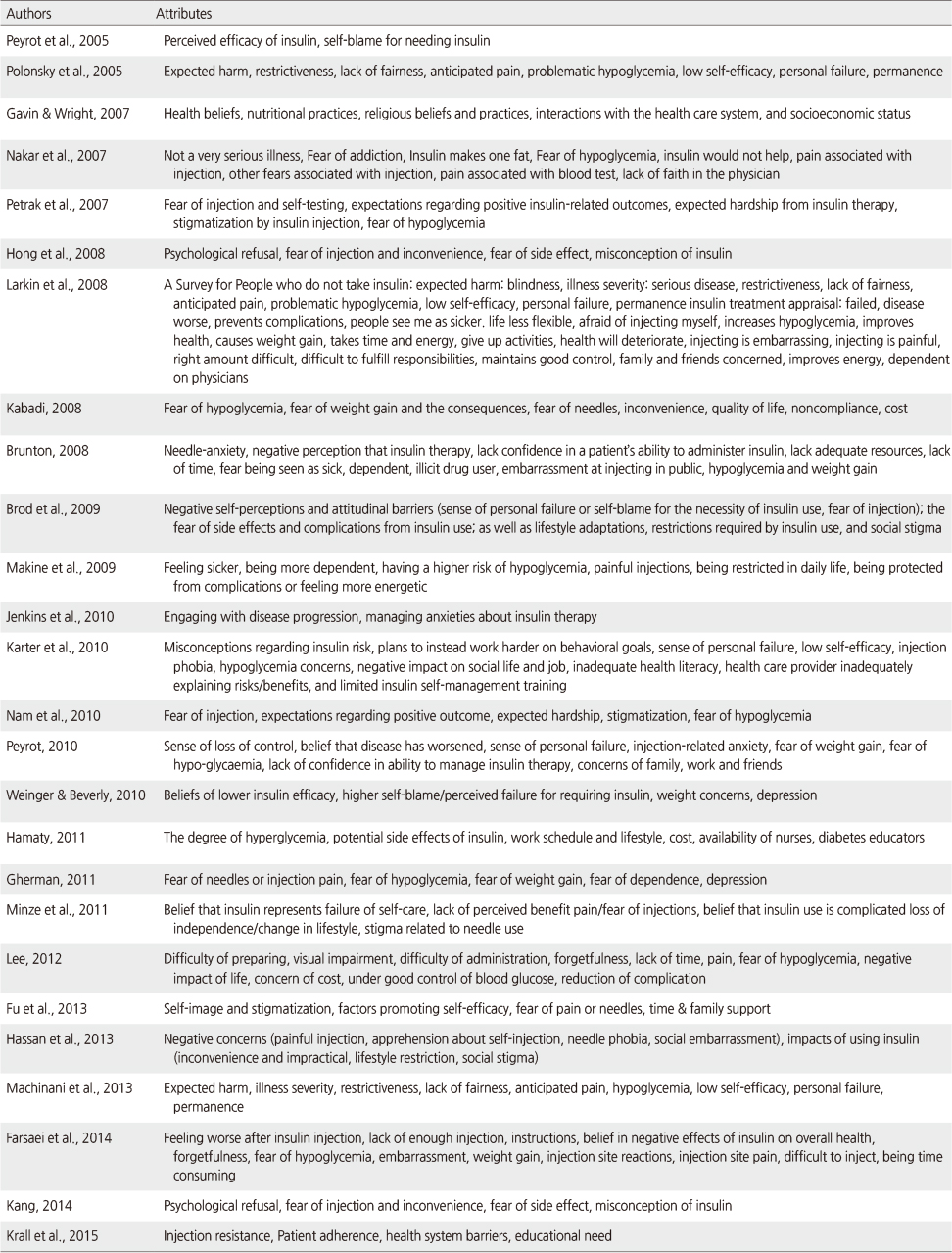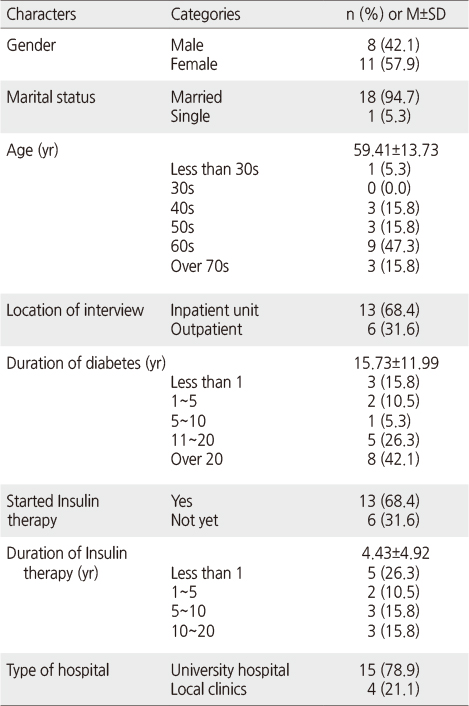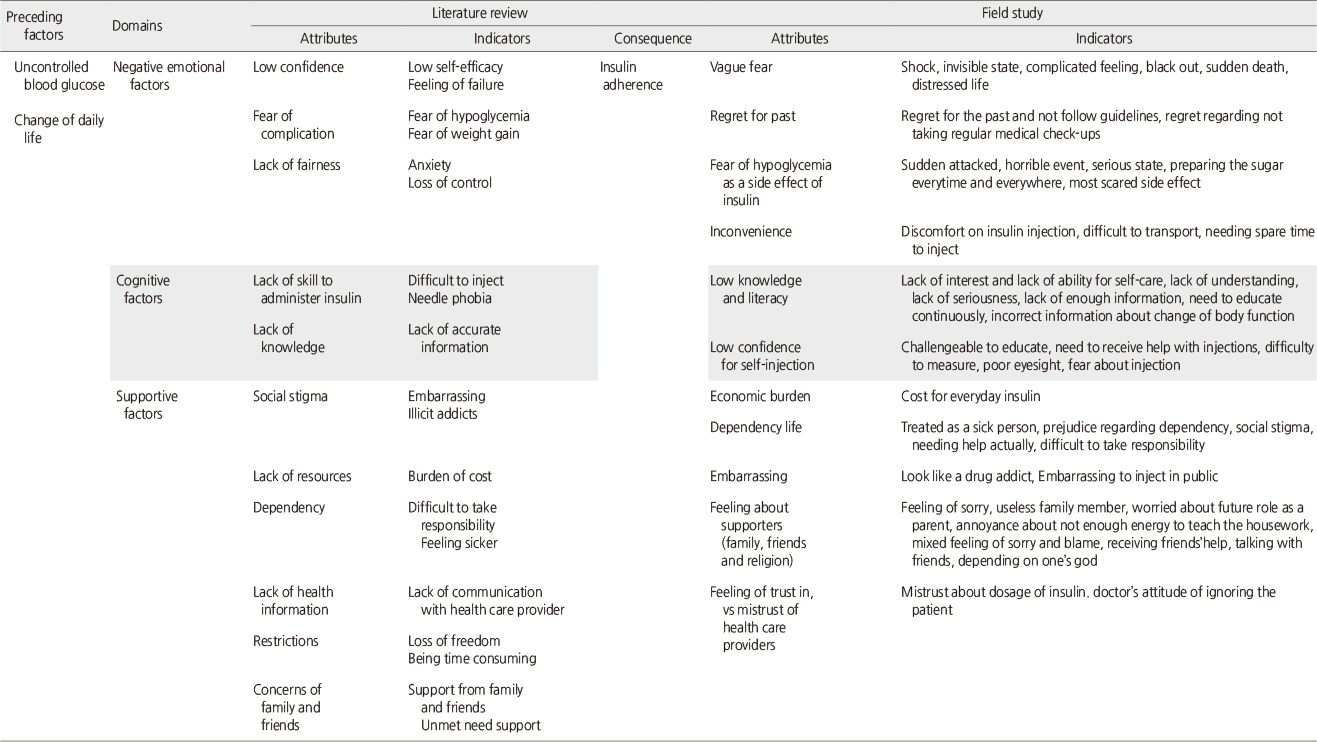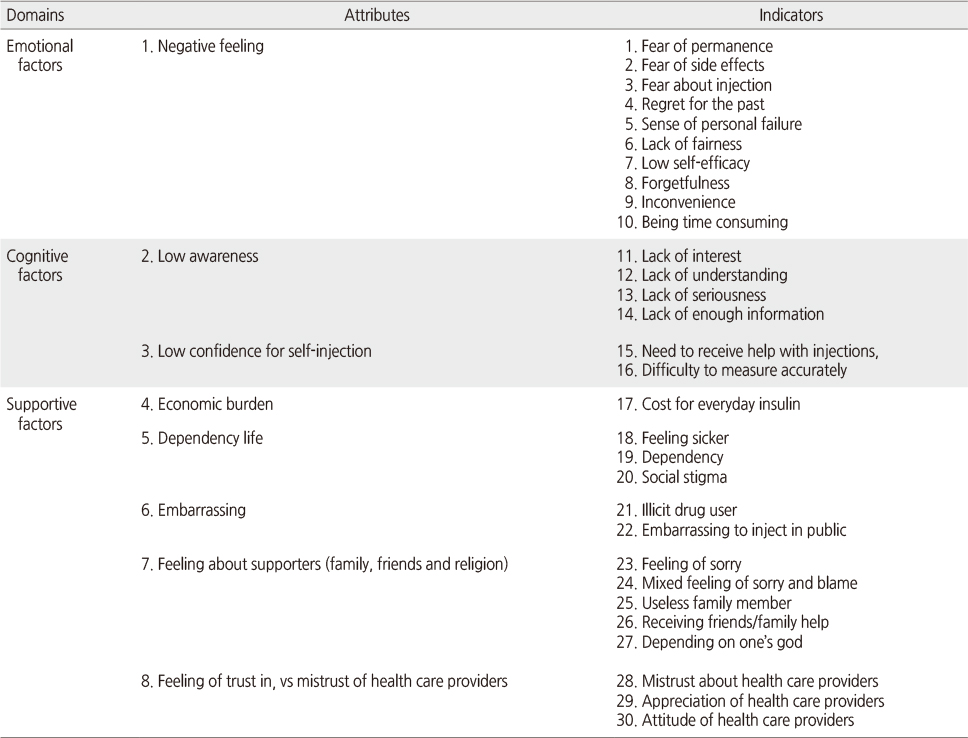Articles
- Page Path
- HOME > J Korean Acad Nurs > Volume 46(3); 2016 > Article
-
Original Article
- Concept Analysis for Psychological Insulin Resistance in Korean People with Diabetes
- Youngshin Song
-
Journal of Korean Academy of Nursing 2016;46(3):443-453.
DOI: https://doi.org/10.4040/jkan.2016.46.3.443
Published online: June 30, 2016
College of Nursing, Chungnam National University, Daejeon, Korea.
- Address reprint requests to: Song, Youngshin. College of Nursing, Chungnam National University, 266 Munwha-ro, Jung-gu, Daejeon 35015, Korea. Tel: +82-42-580-8334, Fax: +82-42-580-8309, yssong87@cnu.ac.kr
• Received: October 20, 2015 • Revised: December 17, 2015 • Accepted: March 30, 2016
© 2016 Korean Society of Nursing Science
This is an Open Access article distributed under the terms of the Creative Commons Attribution NoDerivs License. (http://creativecommons.org/licenses/by-nd/4.0/) If the original work is properly cited and retained without any modification or reproduction, it can be used and re-distributed in any format and medium.
Figure & Data
REFERENCES
Citations
Citations to this article as recorded by 

- Development and validation of a distress measurement for insulin injections among patients with diabetes
Eujin Choi, Min-Sun Kim, Juhee Cho, Sooyeon Kim, Eun Kyung Kwon, Youngha Kim, Danbee Kang, Sung Yoon Cho
Scientific Reports.2023;[Epub] CrossRef - The Mediating Effect of Experiential Avoidance on the Relationship between Diabetes Distress and Self-Stigma in People with Diabetes Mellitus Type 2 in Republic of Korea
Kawoun Seo
Healthcare.2023; 11(20): 2773. CrossRef - The Mediating Effect of Acceptance Action in the Relationship between Diabetes Distress and Self-stigma among Old Adults with Diabetes in South Korea
Hyesun Kim, Kawoun Seo
Journal of Korean Academy of Community Health Nursing.2022; 33(4): 446. CrossRef - Psychological Insulin Resistance: Key Factors and Intervention
Yeon Jeong Jang
The Journal of Korean Diabetes.2021; 22(3): 192. CrossRef - The role of psychological insulin resistance in diabetes self‐care management
Ancho Lim, Youngshin Song
Nursing Open.2020; 7(3): 887. CrossRef - Effect of Psychological Insulin Resistance, Diabetes Distress, and Diabetes Self-Efficacy on the Insulin Therapy Adherence of Patients with Type 2 Diabetes: An Analysis Based on the Actor-Partner Interdependence Model
Ji-Soon Kang, Jun-Hee Park, Jeong-Won Han
Korean Journal of Adult Nursing.2020; 32(2): 167. CrossRef - Willingness of people with Type 2 diabetes to start insulin therapy: Evidence from the South African Tshwane Insulin Project (TIP)
Patrick Ngassa Piotie, Paola Wood, Elizabeth M. Webb, Tessa S. Marcus, Paul Rheeder
Diabetes Research and Clinical Practice.2020; 168: 108366. CrossRef - Predictors of glycemic control after decline of insulin therapy by patients with type 2 diabetes
Luisa Florez, Maria Shubina, Alexander Turchin
Journal of Diabetes and its Complications.2019; 33(11): 107418. CrossRef - Psychological Insulin Resistance and Low Self-efficacy as Barriers to Diabetes Self-care Management in Patients with Type 2 Diabetes
Bohyun Kim, Youngshin Song, Jong Im Kim
Korean Journal of Adult Nursing.2019; 31(1): 61. CrossRef - Factors influencing psychological insulin resistance in type 2 diabetes patients
Ji Hyeon Yu, Hye Young Kim, Sung Reul Kim, Eun Ko, Heung Yong Jin
International Journal of Nursing Practice.2019;[Epub] CrossRef - Development of a Psychological Insulin Resistance Scale for Korean Patients with Diabetes
Youngshin Song, Younghee Jeon, Jeonghwa Cho, Bohyun Kim
Journal of Korean Academy of Nursing.2016; 46(6): 813. CrossRef
Concept Analysis for Psychological Insulin Resistance in Korean People with Diabetes
Concept Analysis for Psychological Insulin Resistance in Korean People with Diabetes
Literature regarding Attributors of Psychological Insulin Resistance (N=26)
Demographics of Participants (N=19)
Domains, Attribute, and Indicators of Psychological Insulin Resistance in Literature Review and Field Study
Domains, Attribute, and Indicators of Psychological Insulin Resistance in Final Stage
Table 1
Literature regarding Attributors of Psychological Insulin Resistance (N=26)
Table 2
Demographics of Participants (N=19)
Table 3
Domains, Attribute, and Indicators of Psychological Insulin Resistance in Literature Review and Field Study
Table 4
Domains, Attribute, and Indicators of Psychological Insulin Resistance in Final Stage
 KSNS
KSNS
 E-SUBMISSION
E-SUBMISSION




 Cite
Cite

